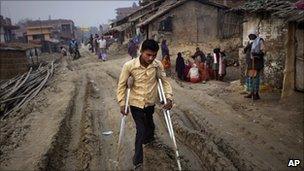Foreign aid fraud warning from National Audit Office
- Published

The level of aid to India will be frozen under plans revealed by the government last month
Government foreign aid chiefs must improve efforts to identify potential fraud, the National Audit Office says.
The spending watchdog said the UK had no clear picture of the "extent, nature and impact" of development funds failing to meet goals due to fraud.
It said value for money was more important than ever.
International Development Secretary Andrew Mitchell has announced that aid will in future be targeted more at war-torn and "fragile" states.
But the National Audit Office (NAO) said such countries were more likely to be beset by poor governance and corruption, heightening the need to ensure money arrived where it was intended.
All nine of the countries where spending is due to be increased by more than 50% are among the worst on that score, according to a leading anti-corruption body.
In its report on financial management at the Department for International Development, the NAO concluded the current approach was "too reactive and cannot provide Parliament and the taxpayer with a clear picture of the extent, nature and impact of leakage".
It went on to say the risk of "leakage... will potentially increase as the spending increases for those countries with less developed controls and capability".
Spending on aid is set to rise by £3.3bn over four years to meet a United Nations target for wealthy nations to spend 0.7% of GDP on development by 2013.
And the Department for International Development's overall £7.8bn budget has been unaffected by the government's deficit-cutting measures.
NAO head Amyas Morse said: "This report shows considerable progress is being made, but a better information environment is needed to deal with the heightened levels of assurance required in targeting future aid at higher-risk locations."
Mr Mitchell said that the report had made some "good points".
"From day one of the coalition government, we set about making fundamental changes to British development policy - for example setting up an independent aid watchdog and pioneering results-based aid."
Last month the government outlined plans to stop direct development aid to 16 countries and freeze the level of assistance given to India.
The countries that will no longer receive direct aid, including Russia, China, Vietnam, Serbia and Iraq. Some, such as Vietnam and Bosnia, are seen to have "graduated" out of poverty.
But there will be more for Bangladesh, Nigeria and Pakistan as aid is "tightly focused" on those considered to be most in need.
- Published1 March 2011
- Published20 July 2010
- Published15 September 2010